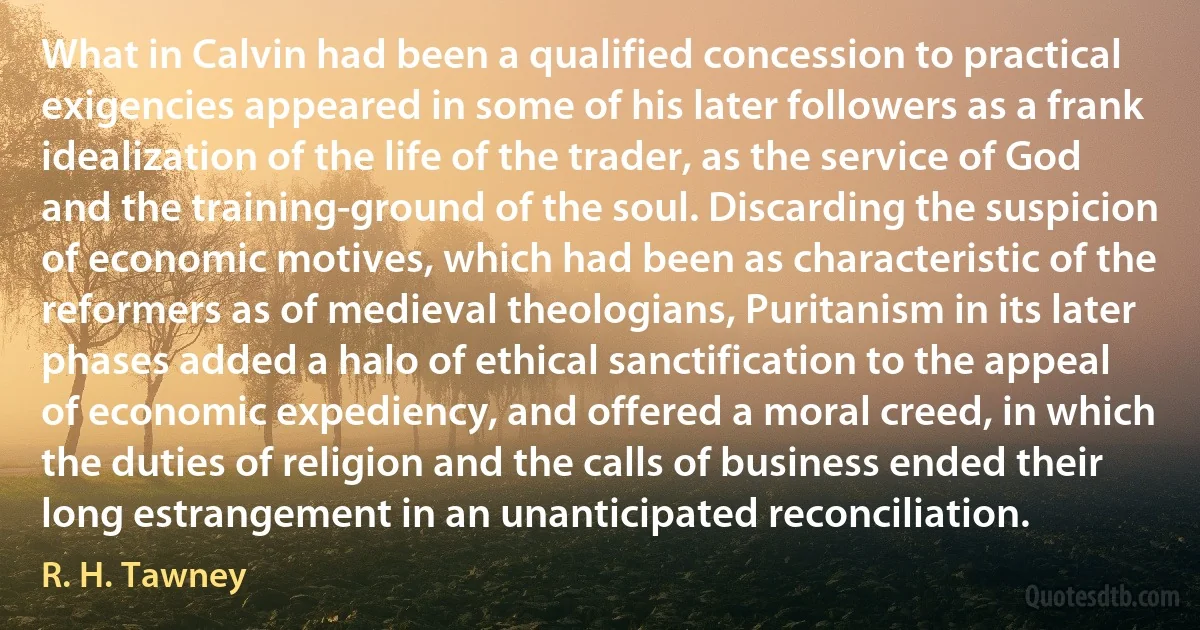
What in Calvin had been a qualified concession to practical exigencies appeared in some of his later followers as a frank idealization of the life of the trader, as the service of God and the training-ground of the soul. Discarding the suspicion of economic motives, which had been as characteristic of the reformers as of medieval theologians, Puritanism in its later phases added a halo of ethical sanctification to the appeal of economic expediency, and offered a moral creed, in which the duties of religion and the calls of business ended their long estrangement in an unanticipated reconciliation.
R. H. TawneyRelated topics
business characteristic concession creed discarding estrangement ethical expediency frank idealization later life medieval puritanism religion sanctification service soul suspicion calvinRelated quotes
The content of his theology was that there was a supreme being who had tried to make us perfect, but presumably had failed; that if one was a Good Man he would go to a place called Heaven.... Upon this theology he rarely pondered. The kernel of his practical religion was that it was respectable, and beneficial to one's business, to be seen going to services; that the church kept the Worst Elements from being still worse; and that the pastor's sermons, however dull they might seem at the time of taking, yet had a voodooistic power which 'did a fellow good - kept him in touch with higher things.

Sinclair Lewis
I can never join Calvin in addressing his god. He was indeed an Atheist, which I can never be; or rather his religion was Daemonism. If ever man worshipped a false god, he did. The being described in his 5 points is not the God whom you and I acknowledge and adore, the Creator and benevolent governor of the world; but a daemon of malignant spirit. It would be more pardonable to believe in no god at all, than to blaspheme him by the atrocious attributes of Calvin. Indeed I think that every Christian sect gives a great handle to Atheism by their general dogma that, without a revelation, there would not be sufficient proof of the being of a god.

Thomas Jefferson
During and after World War II, a large number of academic economists were exposed directly to business life, and had more or less extensive opportunities to observe how decisions were actually made in business organizations. Moreover, those who became active in the development of the new management science were faced with the necessity of developing decision-making procedures that could actually be applied in practical situations. Surely these trends would be conducive to moving the basic assumptions of economic rationality in the direction of greater realism.

Herbert Simon
The Charter was regarded as important because it assigned definite and practical remedies to temporary evils. There was very little that was abstract in its terms, less even than later generations supposed.... A King had been brought to order, not by a posse of reactionary feudalists, but the community of the land under baronial leadership; a tyrant had been subjected to the laws which hitherto it had been his private privilege to administer and to modify at will. A process had begun which was to end in putting the power of the Crown into the hands of the community at large.

G. M. Trevelyan
One of the great weaknesses of the progressive, as distinct from the religious, mind, is that it has no awareness of truth as such; only of truth in terms of enlightened expediency. The contrast is well exemplified in two exact contemporaries - Simone Weil and Simone de Beauvoir; both highly intelligent and earnestly disposed. In all the fearful moral dilemmas of our time, Simone Weil never once went astray, whereas Simone de Beauvoir, with I am sure the best of intentions, has found herself aligned with apologists for some of the most monstrous barbarities and falsehoods of history.

Malcolm Muggeridge
